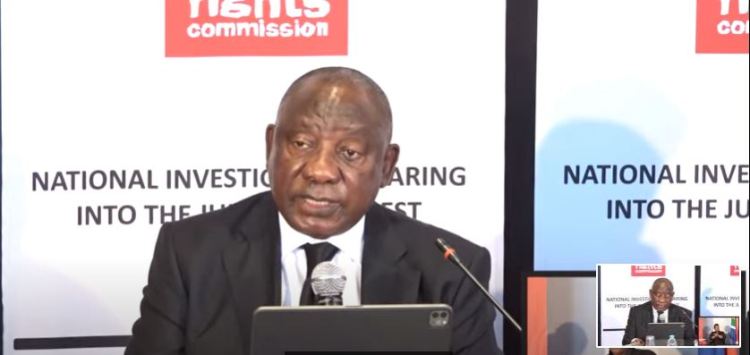South Africa Faces US 30% Tariffs: President Ramaphosa Calls for Trade Resilience
Despite recent tensions, President Ramaphosa stressed the historically complementary nature of South Africa-US trade relations.

- Country:
- South Africa
South Africa is confronting a significant challenge following the United States’ decision to impose a 30% tariff on imports from the country, a move that threatens key export industries and underscores the need for swift adaptation in a shifting global trade environment. President Cyril Ramaphosa addressed the issue in his weekly newsletter, highlighting the urgency of building resilience amid growing international trade turbulence and outlining government strategies to protect the economy and diversify export markets.
Impact of US Tariffs on South Africa’s Economy and Exports
The United States remains South Africa’s second largest trading partner by country, making the newly imposed tariffs particularly consequential. President Ramaphosa cautioned that these duties will have “a considerable impact” on industries heavily reliant on the US market, the workers they employ, and the nation’s fiscal health.
“This decision is not isolated to South Africa. Many developed and developing countries worldwide—several of them African—are grappling with increased US tariffs,” Ramaphosa noted, emphasizing the broader global context of protectionism and shifting trade policies.
The tariffs cast uncertainty over sectors that have traditionally benefitted from preferential access to the US market through the African Growth and Opportunity Act (AGOA). AGOA grants eligible sub-Saharan African countries duty-free entry for over 1,800 products to the US, complementing the Generalised System of Preferences (GSP) program, which covers over 5,000 products.
Longstanding Complementary Trade Relations with the US
Despite recent tensions, President Ramaphosa stressed the historically complementary nature of South Africa-US trade relations. Many South African exports, such as agricultural produce, automotive components, and textiles, do not compete directly with US producers but rather serve as inputs supporting the US industrial base.
“South Africa is the largest African investor in the US, with 22 companies active across mining, chemicals, pharmaceuticals, and food industries,” the President pointed out, underscoring the deep bilateral economic ties that extend beyond trade in goods.
A notable example cited by Ramaphosa is South Africa’s citrus exports. The country is the world’s second largest citrus exporter, supplying counter-seasonal produce that fills critical gaps in the US market caused by declining domestic production. This supply stabilizes prices and offers US consumers greater choice and affordability, factors unrelated to competition concerns.
Government’s Ongoing Engagement and Support Measures
In response to the tariffs, the South African government has intensified diplomatic efforts to engage with US counterparts and safeguard market access for affected exporters. Ramaphosa reaffirmed that all communication channels with the US remain open and that government will continue to advocate for mutually beneficial trade.
To mitigate immediate economic fallout, the government has established an Export Support Desk aimed at assisting companies, producers, and workers vulnerable to the tariff impact. Details of a comprehensive support package will be announced soon, designed to cushion affected sectors and help businesses explore alternative markets.
“This intervention will also guide industries looking to expand exports into other regions, including Africa, Asia, the Middle East, and countries with which South Africa already has trade agreements,” the President explained.
Accelerating Export Market Diversification and Regional Integration
The imposition of US tariffs also presents an opportunity for South Africa to fast-track diversification of its export markets and reduce dependence on traditional partners. President Ramaphosa highlighted the strategic importance of strengthening regional value chains and advancing the African Continental Free Trade Area (AfCFTA) agenda.
“The AfCFTA is key to building long-term resilience by expanding market access across the continent and establishing new trade corridors,” he said. “Reducing over-reliance on specific markets will fortify our economy against external shocks.”
South Africa plans to scale up trade missions and bolster the National Exporter Development Programme to increase the number of export-ready companies. These initiatives aim to open new frontiers for South African goods and services beyond the US, promoting sustainable growth and job creation.
Navigating a Changing Global Trade Landscape
President Ramaphosa’s message underscores the reality that the international trading system is undergoing fundamental changes, with rising protectionism and evolving geopolitical dynamics. The government’s proactive approach seeks to navigate these challenges by balancing diplomatic engagement, domestic economic support, and regional integration efforts.
“Complacency will not serve us,” Ramaphosa warned. “Building resilience is imperative as we adapt to increasingly turbulent trade headwinds.”
South Africa’s confrontation with newly imposed US tariffs signals a critical juncture for the country’s trade policy and economic strategy. By combining steadfast engagement with the US, targeted support for affected exporters, and a concerted push toward diversification and regional integration, South Africa aims to safeguard its export industries while charting a more resilient and diversified path in global trade.
This comprehensive response reflects the government’s commitment to protecting jobs, sustaining economic growth, and expanding opportunities for South African businesses on the continent and worldwide.










